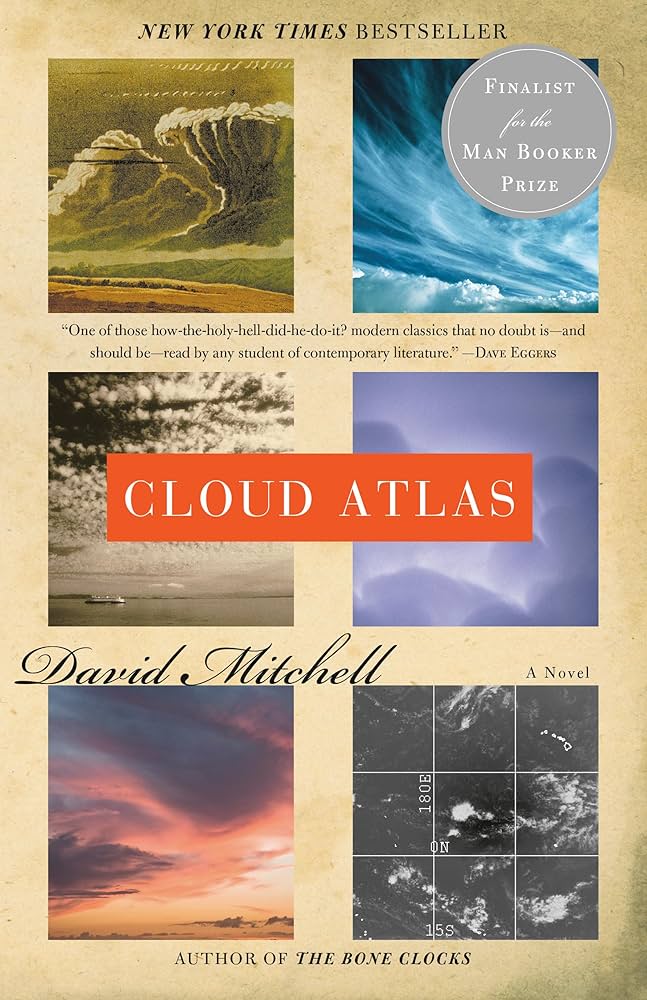It’s tempting to compare Cloud Atlas to its obvious metafictional forebears, If One A Winter's Night A Traveler, The Years of Rice and Salt being chief among them. [1] But almost from the book’s onset my mind kept on travelling back to an unlikely comparison: Chrono Cross.
Not just because of the incredibly ambitious, vaguely-multi-dimensional aspects of the plot and structure, nor for the pleasant and somewhat under-utilized grounding in a distinctly island world.
But because Chrono Cross’s much-ballyhoo’d “dynamic speech engine” (that purported to dynamically alter the story and various cutscenes based on which of the thirty possible characters — a huge amount for the PS1 era! — were in your three-person party at any time) amounted to stuff like this:
Pierre:
Ah, oui?
Is this really
a ghost ship?
Nikki:
Could this really be
a ghost ship...?
Korcha:
This ain'tCHA ordinary
ghost ship...
Razzly:
I've never been on a
ghost ship before...
I'm fairy scared...
Mel:
Wow! So this is
a ghost ship!?
Greco:
Is this...
a ghost ship,
amigo...?
Guile:
What is this...?
Glenn:
So this is
the infamous
ghost ship...?
Macha:
Is this whatCHA
call a ghost ship?
Doc:
I sense human activity
aboard this ship...
Luccia:
Is dis a ghost ship?
...Highly illogical.
NeoFio:
Is this really a
ghost ship?
Which is to say: changes in syntax without changes in anything else. (And a feat in its own right, but falling short of what you might hope.)
Cloud Atlas’s central flaw (or flaws) is that, frankly: the individual stories are not that good, in terms of plotting and prose. Mitchell does a mostly persuasive job of the mechanics — the period pieces scan as period pieces, but the authorial tone and beating of each piece is so flat and one-dimensional that there is very little to be excited about besides thinking about the threads binding the chapters together. [2]
Compare this to the titles which Cloud Atlas usually is bucketed with: the two aforementioned (two of my favorites, to be sure); Pale Fire; A Visit From The Goon Squad. All of these books are lauded not just for what they do outside the form but what they do within it, and Cloud Atlas reads — for a majority of its time — as pulp. [3]
Conversely, I thought the metafiction worked quite well. I went in expecting a Lost-style puzzle box, with very concrete clues and ties explaining how everything added up to a single gestalt; Mitchell denies you such hedonistic pleasures, and you’re left with a more ethereal understanding of these characters and their relationships — their being united in a struggle against power, their solace in consumption of their predecessor’s literature, and so on. (Though even then, the author giveth and he taketh away. I think it was clever, and correct, to lampshade the implausibility of reincarnation and recurrence to deny the easy answer of “ah, this is the same soul in different bodies”, and yet Mitchell felt bizarrely and amateurishly compelled to make sure every single character references the title of the book, a true That’s Chappie moment.)
Mitchell has, I think, very lovely and sweet things to say about the human experience: he believes in the importance and virtue of emancipation, he believes in the exultatory power of art, he believes in redemption.
Cloud Atlas is summed up by its ending lines:
My life amounts to no more than one drop in a limitless ocean. Yet what is any ocean, but a multitude of drops?
A beautiful metaphor, clumsily delivered.
And, to be clear, both of these are much better pieces of literature than Cloud Atlas. ↩︎
A single exception to this: Robert Frobisher’s section. Frobisher’s character is not just the most interesting and surprising of the entire lot but also by far the most entertaining. ↩︎
You can make, I suppose, the argument that this is intentional — one of the books is literally pulp. ↩︎
★★★
